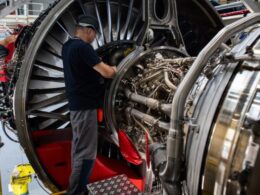Reading headlines about business in China in the past five years, foreign observers might be forgiven for thinking the country of 1.4bn people is no longer worth considering as an investment destination.
From the crushing Covid lockdowns and property sector meltdown to US-led sanctions on Chinese tech companies and now President Donald Trump’s trade war, negative sentiment has abounded.
And yet, on the ground in the world’s second-biggest economy that is also a high-tech manufacturing powerhouse, some lawyers and other advisers still consider China to be a land of opportunity that continues to be misunderstood.
“There are still a lot of opportunities here,” says Joe Chen, a Shanghai-based partner with JunHe, one of China’s top law firms, who has been involved with some of the biggest private equity deals recorded in China.
Some of the merger and acquisition activity is the result of rising geopolitical tensions, as multinational companies act to shift their business out of China. But transactions have also continued for more sanguine reasons, and groups of Chinese investors — such as insurers, some of the most active — remain hungry for deals.
These deals included alternative investment manager PAG’s sale last year of a majority stake in AirPower’s industrial gas unit, Yingde, to a Chinese consortium. According to reports, the deal was valued at about $6.8bn, compared with PAG’s equity investment of $1.5bn in 2017, marking a conventional exit for the group, which is led by Weijian Shan, a veteran Hong Kong-based private equity investor. “For them it was a very normal exit,” says a person familiar with the deal.
Separately, Spain-based healthcare giant Grifols sold a 20 per cent stake in blood products manufacturer Shanghai RAAS to Chinese consumer electronics group Haier for €1.6bn last June. This, JunHe’s Chen says, was a “good asset” that attracted interest from a handful of potential buyers before Haier secured the deal.
Statistics on China’s M&A trends, released this year by PwC’s China team, paint a mixed picture. On the one hand, the value of China’s M&A transactions fell 16 per cent to $277bn last year as the number of so-called megadeals above $1bn fell to the lowest level in nearly 10 years at just 39.
However, PwC also spotted a rebound in venture capital activity, with more than 6,000 deals valued at less than $10mn, up nearly two-thirds in 2024. In terms of the outlook, the firm also saw some “positive” signs, including: pent-up demand for investments; a large number of private equity projects seeking exits; growing demand for overseas investments by Chinese capital; and some big transactions stemming from the reform of China’s state-owned enterprises.
From the perspective of domestic investors, some green shoots can also be detected via the rise of a group of companies that include artificial intelligence start-up DeepSeek, electric-car maker BYD, battery company CATL and pioneering robot maker Unitree. These businesses have been held up by investors, and government officials, as indisputable examples of the country’s high-tech prowess. And since September 2024, President Xi Jinping’s administration has also touted a series of measures aimed at stimulating growth, helping to further improve local sentiment after several years of malaise.
Shaun Rein, managing director of Shanghai-based China Market Research Group, says that despite the onset of the US-China trade war, investors from Europe, south-east Asia and the Middle East remain highly interested in China. But US investors, he notes, are still firmly on the sidelines.
“There’s so much uncertainty with regulations and the political system in the US that they don’t want to be seen as doing anything in China, lest they get attacked by Trump,” he says.
Sentiment among foreign businesses present in China has also struggled to recover after Beijing’s security officials cracked down on consultancies working with foreign multinationals in 2022 and 2023.
During this period, there was a wave of investigations targeting the China operations of US consultancies and due diligence firms, including Mintz Group, Bain & Co and Capvision. It highlighted not only fears over the personal safety of China-based staff, but also concerns around the risk of falling foul of the many security-focused regulations relating to technology, data and privacy.
Alex Roberts, head of Linklaters’ China technology, media and telecommunications team in Shanghai, argues that the regulatory environment is neither as opaque nor as unpredictable as often portrayed.
“When you dig down and understand the rules . . . with more granularity, there’s more similarities with rules in other markets than people appreciate just from reading headlines,” says Roberts, who has more than a decade of experience working in China.
He points to artificial intelligence as one example. The key regulations in China, he says, kick in when providing generative AI tools and other emerging technologies to the public. But businesses have freedom to use AI tools for internal content production and operational efficiencies. “People think that you cannot, as a multinational, use AI products that you’ve developed in-house or indeed procured outside China and use those in China at all. Yes, you can,” Roberts says.
He also believes Beijing is now “much better” at consulting with industry, including multinationals, during the development of new tech regulations. Linklaters has helped clients and trade associations to “plug themselves into that consultation process” and influenced the creation of rules that “actually work for a better business environment”, he says.
“There are plenty of multinationals that are very much ‘long on China’ and, indeed, investment firms that I speak to on a day-to-day basis that are long on China and see a lot of opportunities in China,” Roberts says.
Source link









